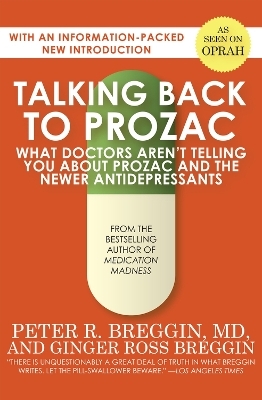
Talking Back to Prozac
Open Road Media (Verlag)
978-1-4976-3877-8 (ISBN)
Prozac. Millions of Americans are on it. And just about everyone else is wondering if they should be on it, too. The claims of the pro Prozac chorus are enticing: that it can cure everything from depression (the only disorder for which Prozac was originally approved) to fear of public speaking, PMS, obesity, shyness, migraine, and back pain—with few or no side effects. But is the reality quite different? At what price do we buy Prozac‑induced euphoria and a shiny new personality?
Psychiatrist Peter Breggin, MD, and coauthor Ginger Ross Breggin answer these and other crucial questions in Talking Back to Prozac. They explain what Prozac is and how it works, and they take a hard look at the real story behind today’s most controversial drug:
The fact that Prozac was tested in trials of four to six weeks in length before receiving FDA approval
The difficulty Prozac’s manufacturer had in proving its effectiveness during these tests
The information on side effects that the FDA failed to include in its final labeling requirements
How Prozac acts as a stimulant not unlike the addictive drugs cocaine and amphetamine
The dangers of possible Prozac addiction and abuse
The seriousness and frequency of Prozac’s side effects, including agitation, insomnia, nausea, diarrhea, loss of libido, and difficulty reaching orgasm
The growing evidence that Prozac can cause violence and suicide
The social and workplace implications of using the drug not to cure depression but to change personality and enhance performance
Using dramatic case histories as well as scientific research and carefully documented evidence, the Breggins expose the potentially damaging effects of Prozac. They also describe the resounding success that has been achieved with more humane alternatives for the treatment of depression.
Talking Back to Prozac provides essential information for anyone who takes Prozac or is considering taking it, and for those who prescribe it.
Peter R. Breggin, MD, is a psychiatrist in private practice in Ithaca, New York. He is the author of many scientific articles and more than twenty books, most recently Medication Madness: A Psychiatrist Exposes the Dangers of Mood‑Altering Medications (2008). Many of his cutting-edge discoveries on the dangers of psychiatric drugs have been affirmed by recent scientific research and by FDA regulatory actions. He has taught at numerous universities and acts as an expert witness in legal cases involving harm done by psychiatric medication and electroshock. Ginger Ross Breggin has coauthored two books with her husband: the bestseller Talking Back to Prozac and The War Against Children of Color. She is also coeditor of Dimensions of Empathic Therapy. For more than a decade, she was director of the International Center for the Study of Psychiatry and Psychology, and she continues to contribute to her husband’s reform work. She cofounded the scientific journal Ethical Human Psychology and Psychiatry and was its first managing editor. She is also an award‑winning photographer.
| Erscheint lt. Verlag | 19.6.2014 |
|---|---|
| Verlagsort | New York |
| Sprache | englisch |
| Maße | 133 x 203 mm |
| Themenwelt | Sachbuch/Ratgeber ► Gesundheit / Leben / Psychologie ► Krankheiten / Heilverfahren |
| Sachbuch/Ratgeber ► Gesundheit / Leben / Psychologie ► Lebenshilfe / Lebensführung | |
| Sachbuch/Ratgeber ► Gesundheit / Leben / Psychologie ► Psychologie | |
| Geisteswissenschaften ► Psychologie | |
| Medizin / Pharmazie ► Gesundheitsfachberufe ► Rettungsassistent / -sanitäter | |
| Medizin / Pharmazie ► Gesundheitswesen | |
| Medizin / Pharmazie ► Medizinische Fachgebiete ► Pharmakologie / Pharmakotherapie | |
| Medizin / Pharmazie ► Medizinische Fachgebiete ► Psychiatrie / Psychotherapie | |
| Medizin / Pharmazie ► Medizinische Fachgebiete ► Schmerztherapie | |
| Medizin / Pharmazie ► Pflege | |
| ISBN-10 | 1-4976-3877-1 / 1497638771 |
| ISBN-13 | 978-1-4976-3877-8 / 9781497638778 |
| Zustand | Neuware |
| Haben Sie eine Frage zum Produkt? |
aus dem Bereich


